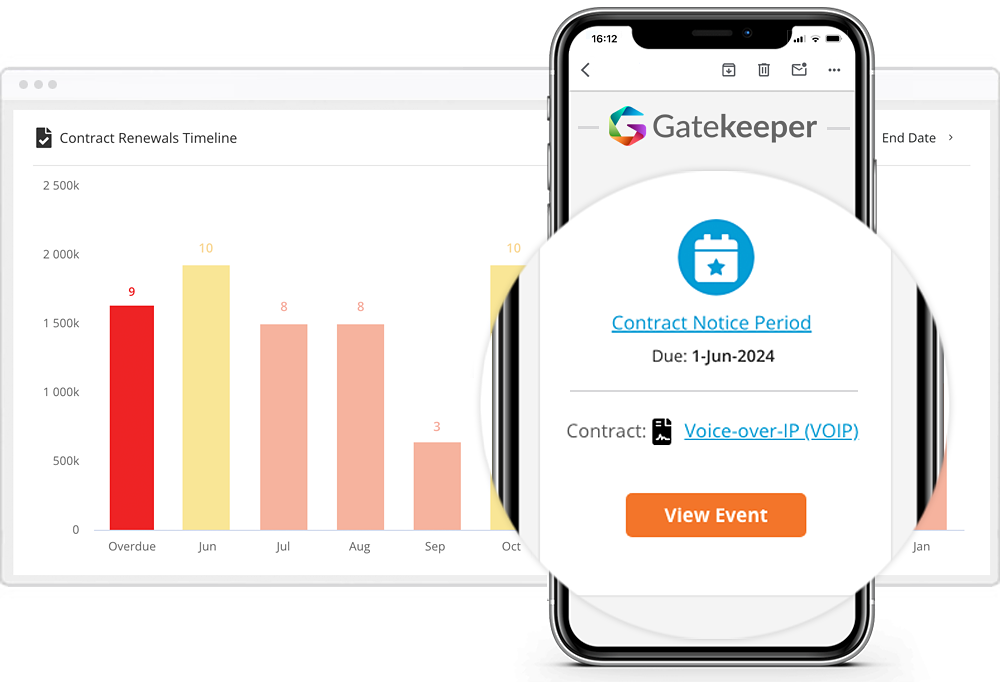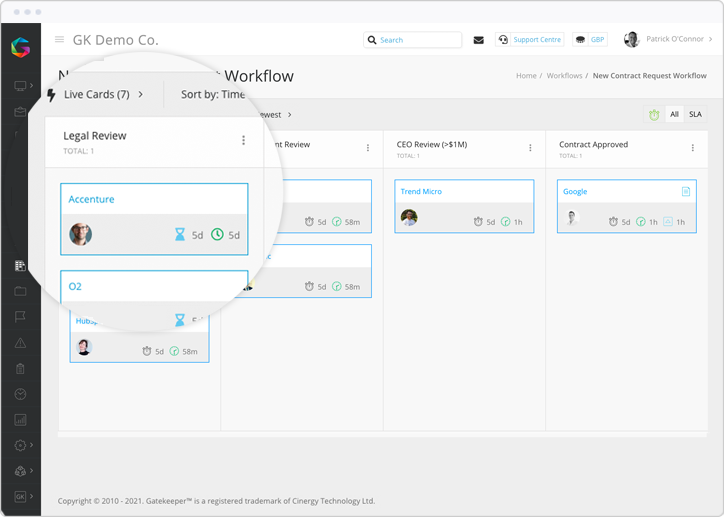Contract renewals best practices for 2025
14:22
Contract Management, Negotiation, Contract Visibility, Control
Ian BryceDec 17, 2024 9:45:00 AM
Contract renewals are more than just events to track. They should be treated as a strategic opportunity to drive greater outcomes via better terms, more competitive service or consolidation.
![]()
In this article, we'll explore:
A contract renewal is the process by which parties to an existing agreement review and discuss the continuation of their current contractual arrangement. This usually occurs when the initial term of the contract is approaching its expiration date.
During the renewal process, both parties have the opportunity to:
Contract renewal management ensures that the contractual obligations and rights established in the original agreement remain in effect for the upcoming term. It also gives you the flexibility to make adjustments based on changing circumstances or preferences of the parties involved.
The process is critical to ensuring your and your vendor's compliance with industry regulations and mitigating risks while fostering stronger vendor relationships.
Despite best intentions, many organisations struggle with contract renewals - often where key dates and obligations are manually tracked. These issues can be particularly damaging in regulated industries, where the stakes are higher.
Contracts are often scattered across emails, spreadsheets, or isolated databases, making it difficult to track renewal dates or assess key terms. For example, a pharmaceutical company may fail to renew a supplier contract tied to production compliance, leading to a lapse in Good Manufacturing Practice (GMP) certifications.
A lack of collaboration between legal, procurement, and operational teams often results in critical renewal information slipping through the cracks. In highly regulated environments, this could mean failing to address new compliance standards.
A lack of collaboration between legal, procurement, and operational teams often results in critical renewal information slipping through the cracks. In highly regulated environments, this could mean failing to address new compliance standards.
Rushed decisions often occur when renewal workflows are initiated too close to the deadline. For instance, a utility provider might miss the chance to renegotiate energy supply contracts, leaving them locked into unfavourable terms that don’t align with decarbonisation goals.
Ineffective contract renewal management can have far-reaching consequences including:
Developing a successful contract renewal strategy is essential for legal and procurement professionals in regulated industries.
Evaluate the performance of existing contracts:
Collaboration is essential. Ensure input from legal, procurement, finance, and operations teams to align priorities and address potential risks. In a healthcare setting, this might involve consulting compliance officers to evaluate medical supplier contracts.
Gather data on vendor performance, market trends, and alternative providers. Use this information to secure favourable terms and align contracts with current requirements. For instance, an energy provider may negotiate better rates with renewable energy suppliers to meet sustainability goals.
Adopt a vendor and contract lifecycle management (VCLM) platform to automate notifications for upcoming renewals, centralise contract storage, and facilitate collaboration between stakeholders and vendors.For example, using a VCLM tool, a pharmaceutical company can flag contracts tied to clinical trial vendors for review well ahead of regulatory updates. This reduces the risk of non-compliance or supply chain disruptions.
Contract renewal strategies should be dynamic, adapting to regulatory changes, market conditions, and organisational needs. Post-renewal, evaluate the outcomes against your objectives and refine your process accordingly.
bRelying on manual processes can lead to missed deadlines, costly errors, or non-compliance risks. A VCLM platform automates the renewal process, providing advanced features such as automated alerts, a centralised repository for contract data, and compliance-driven insights.This enables you to stay ahead of renewal deadlines, renegotiate terms where necessary, and ensure adherence to regulatory requirements without the inefficiencies of spreadsheets or email trails.
By automating these processes, VCLM saves you time, while strengthening governance and reducing risks.By replacing fragmented, manual processes with an automated approach, a VCLM platform enables your regulated business to gain better control, ensure compliance, and optimise the value of its current contracts.
Implementing contract renewal best practices, supported by a VCLM platform, can help to minimise these risks.
Many businesses that manually capture the key dates of their contracts end up storing them in a variety of locations. They might be in a spreadsheet, in an inbox, or captured in a shared drive.
A best practice for businesses, especially in regulated industries like healthcare, finance, or biotech, is to restore visibility by storing all key dates in a centralised repository.All relevant users should be able to securely access the information they need from the repository - saving hours of administration and ensuring that compliance teams, legal, and procurement have the visibility they need.
Once you have key contract dates recorded - such as the end date, renewal date, and review date - you’ve built the foundation for a solid contract renewal strategy. However, simply recording dates isn’t enough. Without an automated system in place, there’s a risk of missing crucial deadlines, which can lead to costly renewals, compliance issues, or lapses in service.Use automated contract reminders, provided by a VCLM platform, to ensure key stakeholders receive timely alerts well before action is needed. It removes the need for manual oversight while improving accountability and efficiency.

Contract renewal best practices involve giving your business enough time to complete the relevant activities.When planning your internal processes, add a further date to your system to kick off a contract renewal workflow to create this opportunity.
To make an informed decision as to whether to review the contract, you’ll need to first:
Your contract renewal procedures might currently rely on manual processes - processes that are prone to human error, time-consuming, and difficult to replicate consistently. These inefficiencies can lead to missed deadlines, unwanted auto-renewals, or compliance risks.By adopting best practice workflows with a VCLM platform such as Gatekeeper, you can transform your contract renewal management into a streamlined, reliable, and proactive process.
Gatekeeper’s specialised workflow engine automates key steps, ensuring that no date or action is overlooked. This reduces the administrative burden of tracking renewals while enhancing accuracy, efficiency, and accountability across your team.

Understanding the current contract, its value to the business, and the vendor’s pricing and capabilities can inform whether or not you would like to renew the agreement.
For regulated industries, this is also an opportunity to ensure all contract clauses continue to align with evolving regulations.
Assuming you want to renew, you can engage your supplier with contract negotiation best practices and an understanding of what you’d like to update (if anything) in the contract.
By having all the relevant information to hand, in good time, you put yourself in the best position to get what you want from the renewal - especially if you want to improve the terms.
By adopting these contract renewal best practices alongside a VCLM platform, your business can minimise risks, ensure compliance, and optimise outcomes. Whether it’s avoiding auto-renewal pitfalls or negotiating better terms, success lies in preparation, automation, and strategic execution.Ready to transform your contract renewal process? Book a demo today to see how Gatekeeper can help streamline your workflows and ensure compliance across every contract renewal.

Ian writes on a variety of topics, bringing together his own knowledge and experience with that of industry experts.
Sign up today to receive the latest GateKeeper content in your inbox.
.png)
.png)
.png)
-4.png)
Before Gatekeeper, our contracts
Anastasiia Sergeeva, Legal Operations Manager, BlaBlaCar
were everywhere and nowhere.
Gatekeeper is that friendly tap on the shoulder,
Donna Roccoforte, Paralegal, Hakkasan Group
to remind me what needs our attention.
Great System. Vetted over 25 other systems
Randall S. Wood, Associate Corporate Counsel, Cricut
and Gatekeeper rose to the top.
Thank you for requesting your demo.
Next Step - Book a Call
Please book a convenient time for a quick call to discuss your requirements.